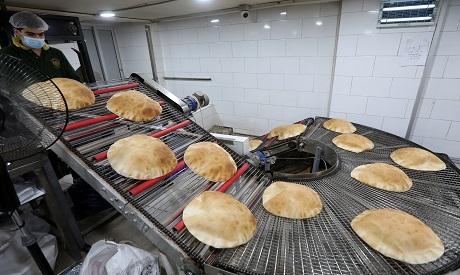
A worker stands near freshly baked bread at a bakery in Beirut, following Tuesday's blast in city's port area, Lebanon August 5, 2020. (Reuters)
Beirut's blast destroyed Lebanon's only large grain silo, with plans for another in the country's second biggest port Tripoli shelved years ago due to a lack of funding, the U.N.'s FAO, Tripoli port director and a regional grain expert told Reuters.
The destruction of the 120,000-tonne capacity structure and disabling of the port, the main entry point for food imports, means buyers will have to rely on smaller privately-owned storage facilities for their wheat purchases, exacerbating concerns about food supplies.
Lebanon, a nation of an estimated 6 million people, imports almost all of its wheat.
"There are smaller storage sites within the private sector millers because they have to store wheat before it is milled into flour," Maurice Saade, the Food and Agriculture Organization (FAO) representative in Lebanon told Reuters.
"In terms of grain silos, that was the only major one."
Dozens are still missing after Tuesday's explosion at the port that killed at least 154 people, injured 5,000 and left up to 250,000 homeless, in a country already staggering from economic meltdown and a surge in coronavirus cases.
With banks in crisis, a collapsing currency and one of the world's biggest debt burdens, Economy Minister Raoul Nehme has said Lebanon had "very limited" resources to deal with the disaster, which by some estimates may have cost the nation up to $15 billion.
The lack of a dedicated grain terminal, silo or grain elevators in Tripoli illustrates a hand-to-mouth approach to food security.
It mirrors how the state has resorted to emergency planning rather than long-term solutions in other key areas, such as the infamously flawed power sector and messy garbage collection, moving from one quick fix to another without the right resources or funding since the end of the 1975-1990 civil war.
"It is risky of course," Hesham Hassanein, a Cairo-based regional grain consultant said.
The country's private millers, around eight in total, will have to navigate new logistics fast for the supply chain to run smoothly, even after some of them suffered damage from the blast. This means trucking wheat to nearby warehouses at a time when most of the traffic meant for Beirut, not just wheat, will also be diverted to Tripoli.
Lebanon's government also did not keep a strategic reserve of grains.
"What happens is the private millers store what they don't have enough space for in their own storage in that Beirut silo and take from there when needed," Hassanein explained.
"This was the inventory in the country, not a government strategic reserve in that sense and it was usually enough for two-and-a-half to three months of consumption."
Economy minister Raoul Nehme has said that only 15,000 tonnes were stored at the silo at the time of the explosion and that Lebanon needed an inventory of around three months' supply at any time for food security purposes.
With a consumption rate of around 35,000 to 40,000 tonnes a month, that translates into over 100,000 tonnes.
Lebanon imports 90 to 95% of its wheat, mostly from the Black Sea region. The bulk of its local wheat production is durum, a type of wheat more suitable for pasta.
On Thursday, Nehme told Reuters his ministry had been planning to create a strategic reserve of around 40,000 tonnes but had not done so yet.
"I saw we didn't have a strategic stock, decided to buy one and got the approval of the council of ministers," he said, adding that they had been in the final stages of negotiations.
"Luckily we did not, it would have been destroyed."
Short link: